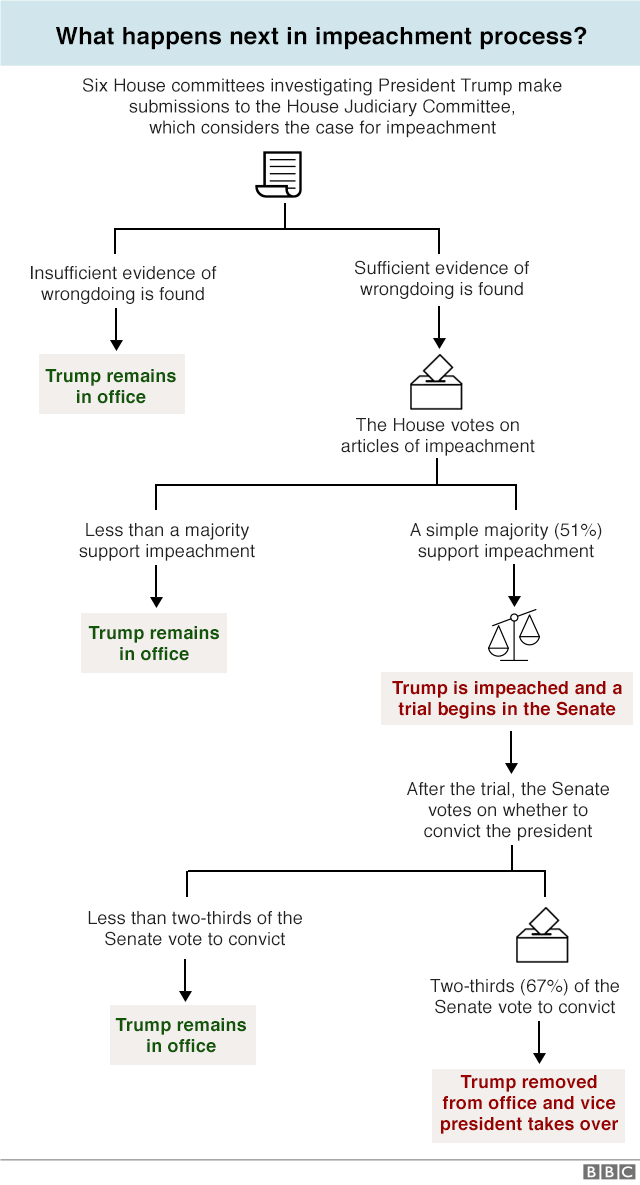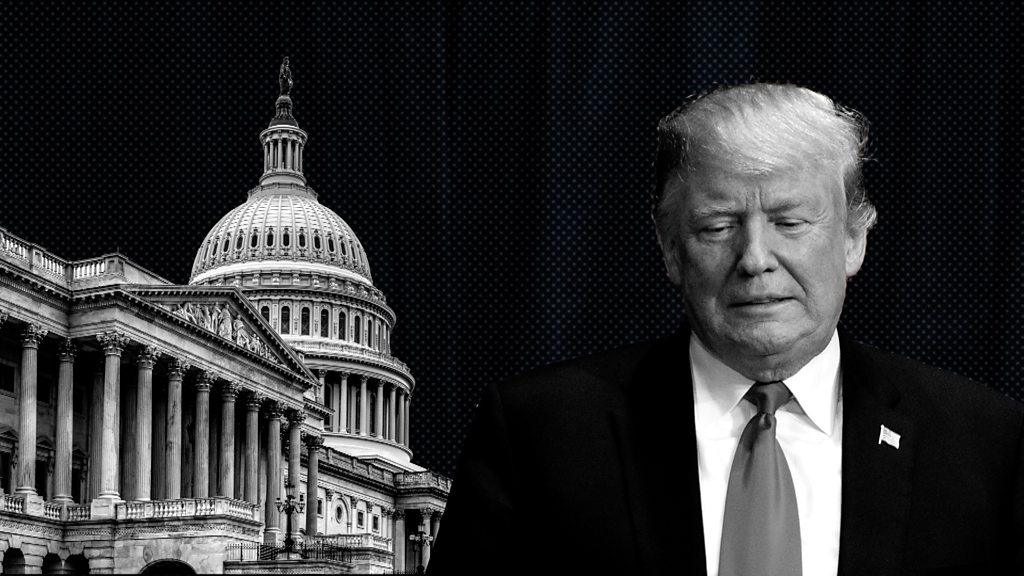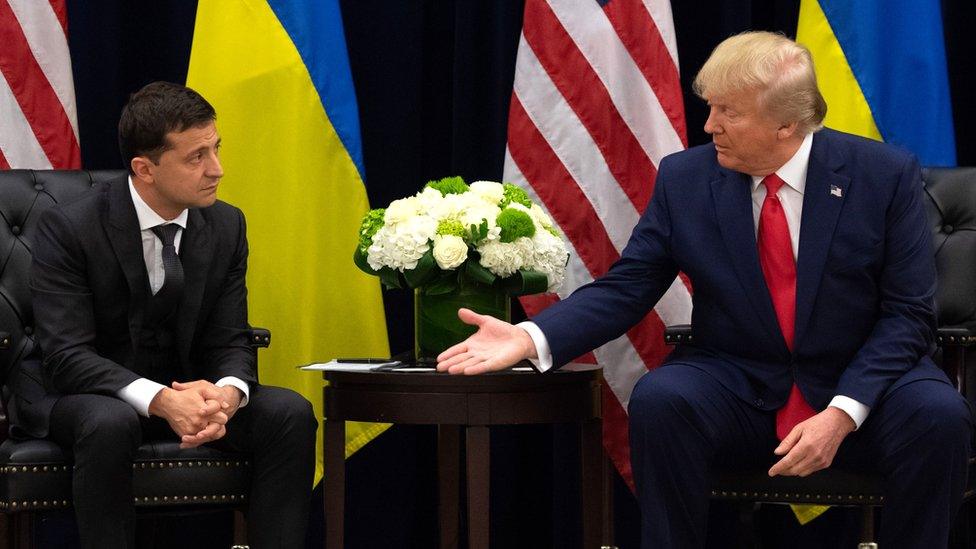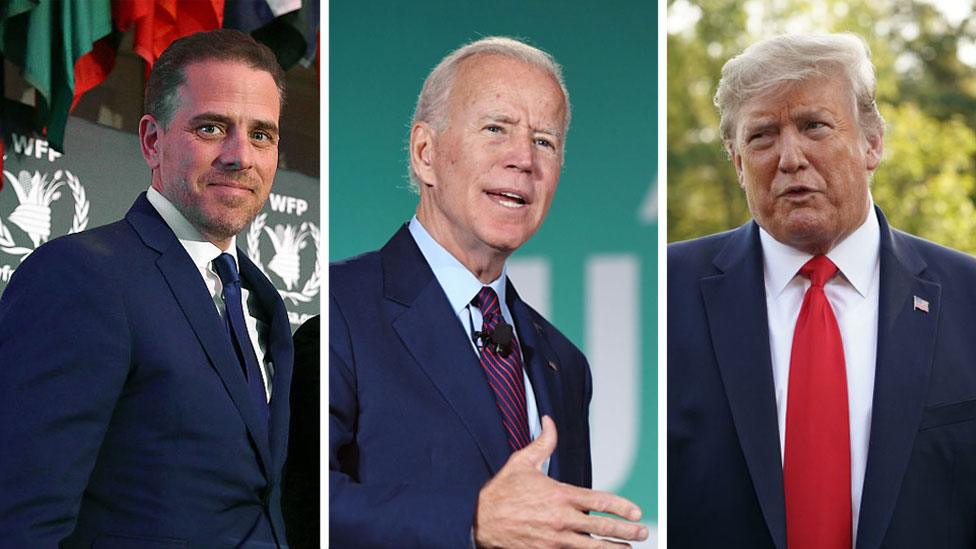Trump impeachment: Schumer calls for White House witnesses at trial
- Published
Chuck Schumer - "Not a single good argument why these witnesses shouldn't testify"
The US Senate's top Democrat has called for current and former White House aides to testify at President Donald Trump's expected impeachment trial.
Chuck Schumer said he wanted senior officials including White House acting Chief of Staff Mick Mulvaney and ex-adviser John Bolton to be summoned.
But Republicans, who control the Senate, have called for a short trial without witnesses.
A vote in the Democratic-run House to impeach Mr Trump is set for Wednesday.
If a majority votes for impeachment, the case will then move to a trial in the Republican-controlled Senate.
The president is accused of soliciting a foreign country to help him politically, by trying to pressure Ukraine to launch a corruption investigation into his Democratic rival Joe Biden.
Mr Trump is also accused of obstructing Congress. The White House refused to allow staff to testify during hearings in the House of Representatives in recent weeks.
The Republican president denies wrongdoing. He has called the Democratic-led inquiry a "witch hunt" and predicted it will backfire by benefiting him in next year's election.
Mr Trump lashed out on Sunday at the Democratic leader of the House, Speaker Nancy Pelosi, tweeting that "Nancy's teeth were falling out of her mouth, and she didn't have time to think!"
On Monday morning, the House Judiciary Committee published its case for impeaching Mr Trump in a 658-page report that charges him with having "betrayed the nation by abusing his high office".
What did Schumer say?
Mr Schumer, a New York senator, made the appeal for witnesses in a letter to Senate majority leader Mitch McConnell on Sunday.
In addition to Mr Mulvaney and Mr Bolton - a former National Security Adviser - he also called for Robert Blair, a top aide to Mr Mulvaney, and budget official Michael Duffey to give testimony at the expected Senate trial.
"All four of these witnesses were asked to testify in the House impeachment inquiry but did not appear," the letter says.
Mr Schumer said the trial must be one "that not only hears all the evidence and adjudicates the case fairly; it must also pass the fairness test with the American people".
Democrat Elissa Slotkin greeted by boos and cheers after backing impeachment
He referred to the "bipartisan spirit" of the 1999 impeachment trial of then-President Bill Clinton in which witnesses were called.
"It is clear that the Senate should hear testimony of witnesses at this trial as well," he wrote, as he called for subpoenas to be issued for the four men.
Mr Schumer said he also wanted the Senate to issue subpoenas for a set of documents that Democrats believe "will shed additional light" on Mr Trump's dealings with Ukraine.
He also laid out a timetable for the expected Senate trial, suggesting that pre-trial proceedings take place on 6 January and that senators and US Supreme Court Chief Justice John Roberts, who will preside over the case, be sworn in the next day. In total, he suggested as many as 126 hours of proceedings.


A SIMPLE GUIDE: If you want a basic take, this one's for you
GO DEEPER: Here's a 100, 300 and 800-word summary of the story
WHAT'S IMPEACHMENT? A political process to remove a president
VIEW FROM TRUMP COUNTRY: Hear from residents of a West Virginia town
CONTEXT: Why Ukraine matters to the US
FACT-CHECK: Did Ukraine interfere in the 2016 election to help Clinton?

Are the witnesses likely to be summoned?
Senate Republicans say they prefer a trial without witnesses, restricting the scope for political spectacle.
Asked on Friday whether he wanted a long or short trial, Mr Trump said it "doesn't matter".
"I'll do whatever I want. We did nothing wrong. So I'll do long, or short," he told reporters.
However, he has also indicated that he would like to see witnesses called such as Joe Biden and his son.
The White House has not yet publicly commented on Mr Schumer's letter. A spokesman for Mr McConnell told Reuters news agency that he would meet Mr Schumer soon "to discuss the contours of a trial".
A Senate vote requires a two-thirds majority to convict the president - and, given that Republicans hold sway in that 100-seat chamber, Mr Trump is widely expected to be acquitted.
While majority leader Mr McConnell has the final say over the trial's format, he could find his options limited if moderate Republicans feel pressure from Democrats to compromise.
Most motions in the proceedings require 51 votes to pass, and Mr Trump's party controls the chamber with a 53-47 majority.
Some conservative Republican senators, however, have already made up their minds.
Lindsey Graham, chairman of the Senate Judiciary Committee, told CBS' Face the Nation show on Sunday: "I'm not trying to hide the fact that I have disdain for the accusations and the process. So I don't need any witnesses."


What's the background?
President Trump is accused of pressuring Ukraine to dig up damaging information on one of his main Democratic challengers for the presidency in 2020, Joe Biden, as well as his son Hunter.
Hunter Biden worked for a Ukrainian company when his father was US vice-president.
Mr Trump is accused of dangling $400m of military aid to Kyiv and the prospect of a White House meeting for Ukraine's president as bargaining chips.
A beginner's guide to impeachment and Trump
This, Democrats say, amounts to an abuse of presidential power, using the office for personal political gain and to the detriment of national security. Ukraine was using that money in its ongoing conflict with Russia.
Mr Trump is also accused of obstructing Congress by refusing to co-operate with the congressional inquiry.
Mr Trump denies using US military aid - which was eventually released - as a bargaining chip. He says it was appropriate to ask Ukraine to investigate "corruption", referring to the energy firm where Hunter Biden worked.
- Published25 September 2019

- Published15 November 2019

- Published5 February 2020
